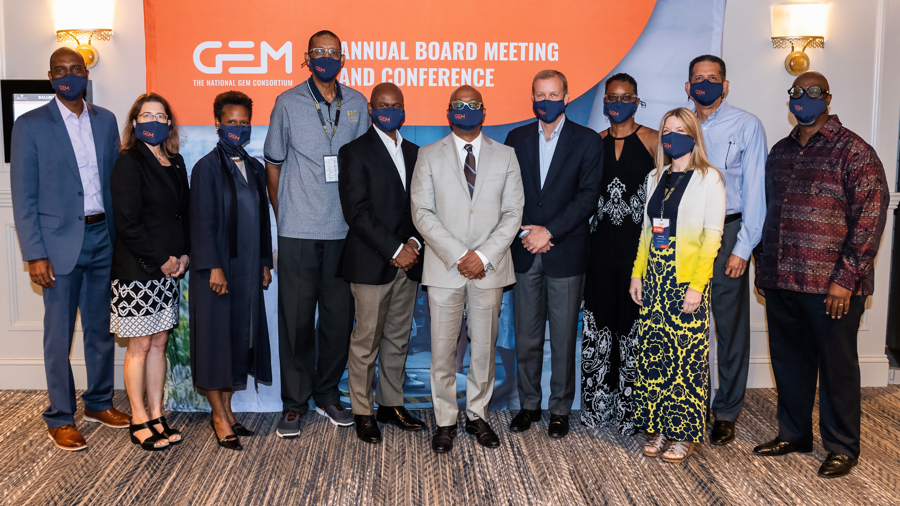You applied to your top 10 graduate schools and as you might have experienced already, waiting for admission letters can be just as nerve-racking, if not more, than the application process itself. February is an awesome month. Not only does the U.S. take the time to learn about Black History and how Black people have impacted the world, but it is also the month universities send out campus visitation letters to their most sought-after students.
When you receive an invite to visit a university’s campus, you officially become a Blue Chip Graduate Student! “Blue Chip” is a sports term that refers to athletes who are amongst the most elite and highly recruited by many universities. Due to the many options available to a Blue Chip, universities invite these students to campus visitations and “role out the red carpet” in order to entice them to select their university. Consider yourself a Blue Chip Graduate Student and be prepared to stroll down the red carpet and be treated like royalty at every university you visit!
Many prospective graduate students go into a campus visit believing it’s an interview. This is exactly the case, with one caveat, you are the interviewer! As you go around interviewing your prospective department, advisor, and laboratory, remember that since the red carpet is rolled out, your campus visit experience may be surreal and may not reflect the everyday graduate student life. This blog will provide you with some tips on how you can take advantage of your campus visit and determine which university is right for you.
To prepare for your campus visit, take some time to research the professors you are scheduled to meet and send your recruiter a list of additional faculty with whom you are interested in meeting. Also feel free to email an advisor yourself, notifying them of your visit and ask for their availability. Skim through recent publications by the advisor in areas of research you are interested in, and jot down a few basic questions. Don’t worry about understanding the whole article, but try to understand the high level contributions.
During the visit, be sure to enjoy the university and its surroundings. Try to imagine yourself living in the environment (university and city) and gauge if it’s a place where you can be successful in your doctoral studies. Aside from the environment, you will most likely meet with your prospective department chair and various other faculty members, your potential research advisors, and other graduate students. You will also have the opportunity to eat at some of the best restaurants around the university; it should be free, so be sure to take advantage! In order for you to properly gauge your potential success and to select the best university, I have prepared the following questions for you to ask the respective parties:
Department Chair or Campus Recruiter (Section 1)
- What is the typical funding package offered to graduate students? Is there a department minimum/maximum? If so, what are they?
- How many years is the funding package for?
- Are graduate students expected to be a Teachers Assistant (TA)? If so, how many semesters? Is TAing a requirement to receive funding?
- How do the funding package and TA hours change if I receive outside funding such as the GEM Fellowship, NSF, etc.?
- Does the department have a rotation program setup for graduate students to try out different labs? If not, is there independent study available to conduct research with a professor?
- How many courses are graduate students expected to take per semester?
- For my incoming year, when am I expected to take the qualifier/proposal? Are they written, oral, or both? How many attempts do students have to pass these exams?
Potential Research Advisor (Section 2)
- Are you accepting students in your lab this Fall/Spring (depending on your admission term). If so, how many?
- What are the open research problems you are looking to investigate? For instance, if I was your Research Assistant, what types of projects are available for me to work on? Be sure to ask some of the questions you jotted down in preparation to your visit.
- How long do students typically take to finish a doctoral degree in your lab?
- Can you lay out my potential roadmap/timeline if I were to become your Research Assistant? (Give the advisor sometime to answer this, you are looking to see if their answer aligns with question 3)
- What would my first 1-2 years look like? Will I be taking courses? Am I expected to do research while I am taking courses?
- By year 3, am I expected to focus solely on research, or do you typically have students take courses throughout the duration of their doctoral degree? What type of hours do you expect students to work in your lab?
- Are there any expectations on publishing before I finish my degree?
- How many doctoral students have you had in the last 5 years?
- How many doctoral students have you graduated in the last 5 years?
- How do you typically interact with your Research Assistants? For example, through email, phone, weekly/biweekly/monthly in person/lab meetings.
- What is the current make-up of your lab when it comes to graduate/undergraduate students and post docs? How many of each? Would you call your lab collaborative or do students typically work on projects individually?
- When a student in your lab receives a PhD, do they typically end up in “industry” or “academia”? Which do you prefer your students to enter?
- What is the typical funding package offered to YOUR graduate students? (Note the difference in this question to your potential advisor as opposed to the Department Chair or Recruiter)
- How many years do you typically provide funding?
- Do you expect your students to TA your courses? If so, how many semesters? Do I have to TA if I have my own funding?
- Are you expecting to take a sabbatical anytime soon? If so, what year? How do you plan to interact with your graduate students during your sabbatical?
- Have graduate students in your lab given birth or had children while in pursuit of their graduate degrees? (This question is essential if you are planning to have children soon, especially if you are a female planning to have children.) How much time did you allow for maternity/paternity leave? What are your expectations before/after pregnancy?
- Note: In industry, I believe an employer is not allowed to ask if you are planning to have children. I would expect this to hold true in a university setting since you will essentially be an employee. Meaning, you do not have to answer this question, and should not be asked it.
Graduate Students in Your Prospective Research Lab or Graduate Student Panel (Section 3)
- Note: These questions should be asked in a private setting with just graduate students. No faculty should be in the room. From my experience, graduate students tend to speak mostly about the negative experiences of graduate school. Try your best to understand the negative, but also ask what are the positives. Be sure to ask them to answer questions in comparison to what they heard from their colleagues at other universities. Most students will provide horror students; ask if there’s any “happily-ever-after” stories
- What is it like working for Dr. “your potential advisor.”
- What are the typical working hours for a student in Dr. “your potential advisor” lab?
- What advisors do you recommend I work with in respect to my research area?
- Do graduate students ever have trouble with funding in any particular lab?
- How many years have you been in the program?
- How many years does it take for someone to complete a PhD in the department? How many years in your particular lab?
- What is the typical qualifying/proposal process like? In what years are they typically completed? Do most students pass the qualifier/proposal?
- Are you planning to pursue “industry” or “academia?” Why? Was your answer different when you began your program?
- Why did you select this university to pursue your PhD? Do you believe you made the right choice?
- Do you have any free time? What do graduate students typically do with their free time?
- I am looking to work with Dr. “your potential advisor” who is currently an “Assistant” professor. Do you recommend I work with this professor even though they do not have tenure?
- Typically, Assistant Professors are very engaged with their research and your ability to contribute to the field is extremely important to the Assistant Professors success in receiving tenure. Meaning, you will most likely have a lot of face time with an Assistant Professor. This is not to say this will not be the case with an Associate or Full Professor
- If your advisor does not receive tenure, you will have to make one of two of the following decisions:
- When your advisor changes universities, you may have to follow the advisor, meaning you could be moving across the country.
- You will have to find a new advisor at your current university who may or may not allow you to continue your previous research.Note: A faculty member who is an “Assistant Professor” is not a tenured faculty member and may or may not receive tenure in the future. This is very important to know for many reasons:
It’s customary for Blue Chip Athletes to hold a press conference, donning a baseball cap of the university they plan to attend. Though there will likely be no press conference held for your graduate school selection (unless your parents plan to hold one for you), you can always buy a university’s hat to stay inline with tradition. Before you decide on which hat you will wear, be sure to have all of your essential questions answered and make the most informed decision.
Disclaimer: This blog does not provide facts or rules, but reflect heuristics I have learned from personal experiences and from others who have endured the journey while in graduate school. Opinions in this blog are those of the writer and may not necessarily reflect the opinions of GEM.
By: Dr. Corey E. Baker. This blog was written while he was a GEM Fellow and graduate student at the University of Florida. Dr. Baker is an Assistant Professor in the Department of Computer Science at the University of Kentucky. Follow him on Twitter: @DrCoreyBaker. His personal website is coreyebaker.com.






